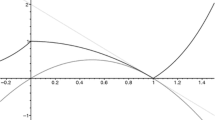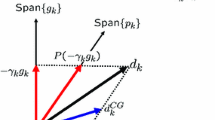Abstract
In this note we show that for a large class of optimization problems, the Lagrange multiplier rule can be derived from the approximate multiplier rule.
Similar content being viewed by others
References
Beer G.: Topologies on Closed and Closed Convex Sets, Mathematics and its Applications, vol. 268. Kluwer, Netherlands (1993)
Borwein J.M., Zhu Q.J.: Techniques of variational analysis. CMS Books in Mathematics/Ouvrages de Mathématiques de la SMC, 20. Springer, New York (2005)
Burke J.V., Lewis A.S., Overton M.L.: Approximating subdifferentials by random sampling of gradients. Math. Oper. Res. 27, 567–584 (2002)
Dutta J.: Revisiting the Lagrange multiplier rule. Pac. J. Optim. 2, 501–519 (2006)
Dutta, J., Pattanaik, S.R., Théra, M.: An approximate Lagrange multiplier rule, Optimization Online. http://www.optimization-online.org/DB_HTML/2009/06/2310.html
Fabian M.: Subdifferentiability and trustwothiness in the light of a new variational principle of Borwein and Preiss. Acta Univ. Carol. 30, 51–56 (1989)
Ioffe A.: Regular points of Lipschitz functions. Trans. Am. Soc. 251, 61–69 (1979)
Jourani A., Thibault L.: A note on Fréchet and approximate subdifferentials of composite functions. Bull. Austral. Math. Soc. 49, 111–116 (1994)
Mordukhovich B.S.: Metric approximations and necessary optimality conditions for general classes of extremal problems. Soviet Math. Dokl. 22, 526–530 (1980)
Mordukhovich B.S.: Variational analysis and generalized differentiation. I. Basic theory. Grundlehren der Mathematischen Wissenschaften [Fundamental Principles of Mathematical Sciences], 330. Springer, Berlin (2006)
Mordukhovich B.S.: Variational analysis and generalized differentiation. II. Applications. Grundlehren der Mathematischen Wissenschaften [Fundamental Principles of Mathematical Sciences], 331. Springer, Berlin (2006)
Mordukovich B.S., Shao Y.: Fuzzy calculus for coderivatives of multifunctions. Nonlinear Anal. 29, 605–626 (1997)
Van Ngai H., Théra M.: A fuzzy necessary optimality condition for non-Lipschitz optimization in Asplund spaces. SIAM J. Optim. 12, 656–668 (2002)
Rockafellar, R.T.: Large-scale extended linear-quadratic programming and multistage optimization. In: Advances in Numerical Partial Differential Equations and Optimization: Proceedings of the Fifth Mexico-United States Workshop, vol. 2, pp. 247–261 (1991)
Rockafellar R.T.: Lagrange multipliers and optimality. SIAM Rev. 35, 183–238 (1993)
Rockafellar, R.T.: Extended nonlinear programming. In: Nonlinear Optimization and Related Topics (Erice, 1998), Appl. Optim., vol. 36, pp. 381–399. Kluwer, Dordrecht (2000)
Rockafellar R.T., Wets R.J.B.: Variational Analysis. Springer, Berlin (1998)
Vinter R.: Optimal Control. Birkhauser, Boston (2000)
Author information
Authors and Affiliations
Corresponding author
Rights and permissions
About this article
Cite this article
Dutta, J., Pattanaik, S.R. & Théra, M. A note on an approximate lagrange multiplier rule. Math. Program. 123, 161–171 (2010). https://doi.org/10.1007/s10107-009-0320-7
Received:
Accepted:
Published:
Issue Date:
DOI: https://doi.org/10.1007/s10107-009-0320-7
Keywords
- Lagrange multiplier rule
- Locally Lipschitz functions
- Subdifferential
- Composite optimization
- Nonsmooth calculus




